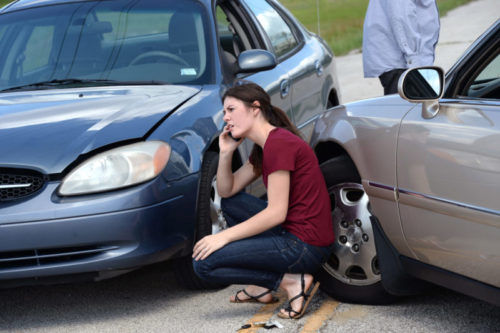After An Accident
Thousands of car accidents occur every day (15,913, to be precise, according to the National Highway Traffic Safety Administration). Many are low-impact fender benders or other minor crashes. Some, however, involve major expenses, either from the resulting damage or the injuries sustained during the accident.
When there are big dollars involved the stakes go up, and the insurance policies in place may not be enough to cover expenses. Or even if the policy has enough coverage, the insurance company may decide not to pay what you believe they owe you based on their assessment of how much you were to blame for the crash, your past history as a driver, or an inaccurate police report. You may also find yourself dealing with an uninsured motorist who, if they are at fault, will have to pay you (or your insurance company) out of their own pocket.
In all these scenarios, if the parties involved can’t come to an agreement on who is responsible for what costs, the matter often ends up being decided in a court of law.
The following are some of the situations you might encounter after a car accident in which hiring an attorney is likely in your best interest:
You or other parties have sustained a severe injury, or a death has resulted from the incident
If you or someone else involved in the accident has been badly hurt, it’s important to consider your legal options. It’s particularly important if you’ve been injured and are looking at significant costs over and above your Personal Injury Protection (PIP) limits and/or what your health insurance will cover. You and/or the other driver involved may not even have PIP (it’s not required in the state of Washington), and if personal health insurance won’t bridge the gap, you will definitely need to do what you can to recover your expenses.
When considering whether to get an attorney due to an injury you should also consider the matter of “severity,” which is a measurable quality in the eyes of the court. Severity factors include:
• The kinds of injuries you’ve suffered
• How long it will take you to recover
• The cost of your initial treatment and future procedures
And while it may go without saying, if a death resulted from the accident, you absolutely need to consult with an attorney as soon as possible, to make sure you understand whatever legal ramifications might be involved.
You or other parties are dealing with a long-term injury or permanent disability
If you or someone else involved in the accident is dealing with one of these kinds of injuries, it’s even more important to consider your legal options since you will likely be incurring even higher expenses. The ramifications of long-term injuries or disabilities can mean not just pain and suffering, but can also compromise the ability to work and depress earning ability. In the realm of legal definitions the expression “long-term” usually applies to an injury that lasts a year or longer.
Other parties were involved, such as pedestrians or multiple other cars
The possible legal liabilities that come with an extensive crash or anything that involves a pedestrian are hard to unravel, and will almost certainly require the help of an expert who can advocate on your behalf.
The insurance company underpays you (or decides not to pay)
At the end of the day, insurance companies are running a business. Thus, if they believe they have a provable argument for why a policyholder is not at fault in a car accident, they will refuse to pay.
In Washington State, the insurers for the two parties generally will come to an agreement on a percentage of blame (known as comparative fault), and pay out accordingly. However, if you disagree with that agreement, you can take the matter to court and argue for a different allocation.
And you very well may disagree with their assessment of fault. The major tool which insurance companies use to determine comparative fault is the police report describing the incident. This means that the circumstances of the accident as described to the police right after the accident—a time when you may not have been thinking clearly—are hugely important. Later on, you might realize something about the incident that the police never recorded. Maybe you rear-ended someone whose brake lights weren’t operational, for instance, but were too shaken up by the wreck to mention that to the police.
One definite indication you need an attorney to help you deal with your insurer? Getting a letter or any correspondence that indicates they have activated their legal team. If that happens, you’ll want to start investigating your legal options immediately.
You generally need help understanding your situation
In any of the above scenarios, there are a wide range of considerations and options. Navigating the specifics of insurance adjustments and claims can be confusing. Should you choose to dispute an insurance company’s decision, it means you are going up against a monolithic entity with a deep understanding of how to use the law to their advantage. If you’ve been injured, you may struggle to decide on legally reasonable compensation for lost wages, or for the pain you may have endured as you attempt to recover. If you want to make sure you understand all the angles and are equipped with full knowledge of your situation, a seasoned attorney can help.


